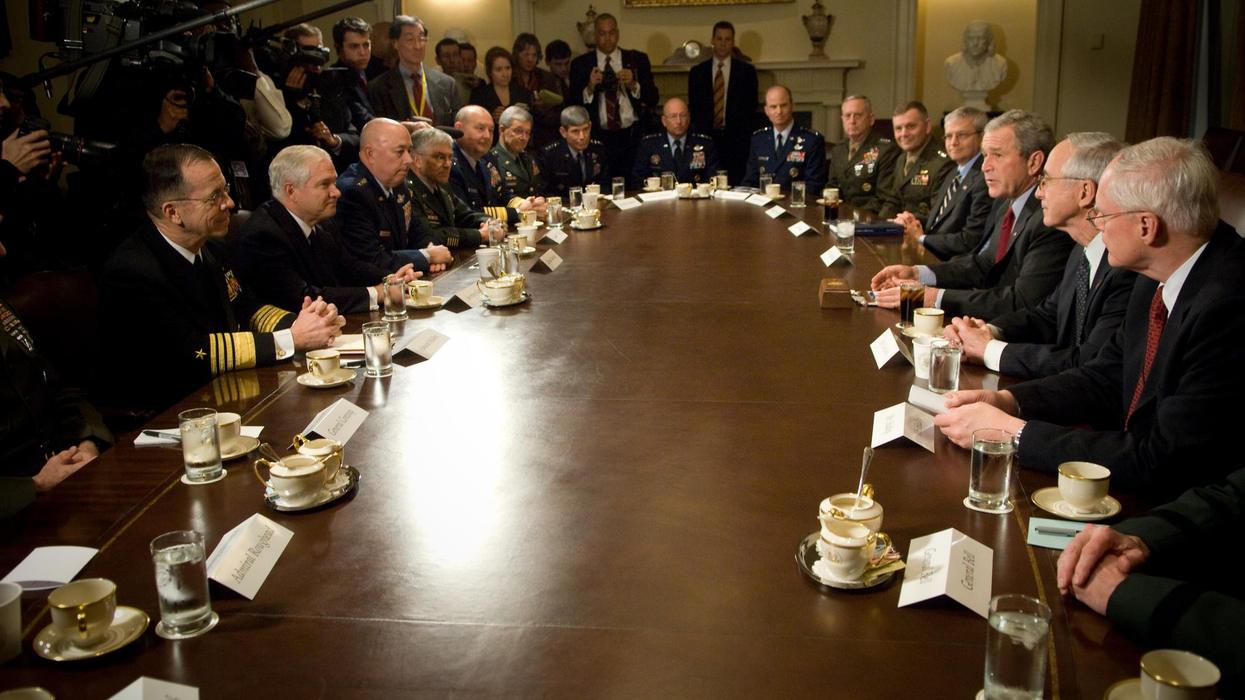Authors of a new Council on Foreign Relations report are framing government subsidies and bailouts for key tech industries as a national security imperative. Not surprisingly, many of the report’s authors stand to benefit financially from such an arrangement.
Published last week, the report, titled U.S. Economic Security: Winning the Race for Tomorrow’s Technologies, urges, among a range of measures to build and onshore the sector, that “government intervention in the economy in the name of national security is most clearly warranted in cases of market failure.”
Framing China as a threat to American tech supremacy in the realms of AI, quantum computing, and biotechnology, the report recommends the U.S. financially support these industries to compete. Notably, it calls for the U.S. to offer loan guarantees for critical technology start-ups, and establish a $900 million grant program to subsidize the costs for facilities building the electronic boards needed to back powerful AI servers.
A quick glance at the task force membership roster shows these are not independent experts nor analysts, but individuals heavily invested in these emerging technologies and government contracting.
Task force co-chair James Taiclet is the president and CEO of Lockheed Martin, one of the “Big Five” prime defense companies. It relies on the U.S. government for 73% of its annual revenue, raking in $313 billion in U.S. defense contracts from 2020 to 2024. It is also heavily invested in integrating AI in its weapons systems.
Another report co-chair and now a CFR distinguished fellow, Gina M. Raimondo, served as secretary of commerce under the Biden administration; years before that, she founded venture capital firm Point Judith Capital, which invests heavily in AI companies. The other co-chair, Justin Muzinich, served as the deputy secretary of the U.S. Treasury during the previous Trump administration; before and after that (to the present), he led his father’s global credit investment firm, Muzinich & Co., which invests in the technology and industrial goods sectors.
But it doesn't end there.Task force member Michele Flournoy, an Obama-era Pentagon official, is listed as "WestExec Advisors" but she is also on the board of defense contractor Booz Allen Hamilton. Flournoy also founded the Center for a New American Security (CNAS), a think tank known for its status quo interventionist approaches on myriad U.S. foreign policy issues. In 2023 alone, CNAS received at least $910,000 from defense contractors and $860,000 from the federal government. As for WestExec, reports indicate its client list includes tech companies including AI defense start-ups for which Flournoy has been a high profile proponent, and Palantir.
Also on the CNAS board of advisers, CFR report task member Peter Scher is vice chairman of JPMorgan Chase — an investment banking company whose tech-related investments suggest it might benefit from the financial de-risking the report pushes for that sector.
And task force member Thomas Donilon, who is listed as National Security Adviser (2010-2013), is now the Vice Chairman at Blackrock, an asset manager currently putting billions toward the AI-related infrastructure the CFR report says the U.S. government should subsidize.
Aditi Kumar is listed as being at Harvard's Belfer Center, but she is also the former principal deputy director of the Defense Innovation Unit (DIU). Working to corral commercial technologies into the defense space through that role, Kumar is now in a task force calling for major public funding to support that same commercial tech sector — possibly helping out companies she worked with in the process.
A slew of venture capitalists and other investors, also occupy the reports’ task force. Task force member Sigal Mandelker, the former Under Secretary of the Treasury for Terrorism and Financial Intelligence, now works at Ribbit Capital, which invests in many AI-focused companies; she is also involved with CNAS. Meanwhile, Noubar Afeyan is founder and CEO of Flagship Pioneering venture capital firm, which invests frequently in deep tech, and Sadek Wahba is a founder at I Squared Capital, whose investments focus on energy, utilities, transport and telecommunications-related projects.
The CFR report comes as tech companies increasingly cite their AI-related endeavors as integral to U.S. national security to make the case the U.S. should help them. As the AI bubble swells, companies are increasingly burning through their finances to compete in that market.
CFO of OpenAI Sarah Friar took heat early this month for suggesting the U.S. government should act as a “backstop” for financing its infrastructure, under the argument that AI is a “national strategic asset.”
OpenAI has since walked back these comments; others in the space are reinforcing their gist. AI "could go wrong in lots of ways. But, again, [the U.S. needs] to absorb a lot of risk there, because it's either going to go right and wrong for us or it's going to go right and wrong for China,” Alex Karp, CEO of Palantir, a software company notorious for weaponizing AI in wars in Ukraine and in Gaza, said in a recent media appearance.
Blackrock CEO Larry Fink said during a CNBC interview in October: “we as a country need …investments if we're going to be the leader in AI technology…I do believe [the U.S. is] going to need to spend this money to win on a geopolitical basis.”

















